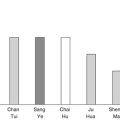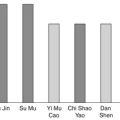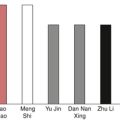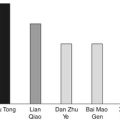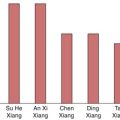Chapter Ten. Herbs that regulate the Qi
 |
1. What are the indications for herbs that regulate the Qi?
Herbs that regulate the Qi are able to regulate, harmonize or spread the Qi so they can treat the syndrome of Qi stagnation. Stagnation of Qi is often caused by emotional disturbance, and accumulation of internal Cold, Heat, Phlegm, water and food. It also occurs in trauma and stagnation of Blood.
The characteristic of the syndrome of Qi stagnation is distension in the affected region. The quality of distension is determined by the degree of the stagnation; generally speaking, fullness exists in a mild case, distension is seen in an advanced stage, and pain occurs in a severe condition.
The syndrome of Qi stagnation varies according to the affected organs and regions. If the Lung-Qi stagnates, the symptoms are breathlessness, stifling in the chest, cough and wheezing. If the Stomach-Qi and Spleen-Qi stagnate, the manifestations are fullness and distension of the entire abdomen, reduced appetite, belching, acid regurgitation, nausea, vomiting, abdominal pain and irregular bowel movement. If the Liver-Qi stagnates, the symptoms are hypochondriac distension and pain, irritability, depression, distension and pain in the breasts, irregular menstruation, and pain in the lower and lateral abdomen. If the Qi stagnates in the meridians, the main symptoms are stiffness, heaviness, numbness or tingling of the limbs and in the affected regions, or migrating pain in the limbs. Most patients with a syndrome of Qi stagnation have a white tongue coating and a wiry pulse when there are no other pathogenic factors.
As well as treating the syndromes mentioned above, in clinical practice these herbs are often used to treat accumulation of water, Phlegm or food and stagnation of Blood, since these pathological factors always cause Qi stagnation and make the original disorder worse. Herbs that regulate the Qi can stimulate the movement of Qi as well as enhancing the effect of other herbs that treat different accumulations. Furthermore, herbs that regulate the movement of the Qi are often used in formulas for tonification because the tonifying herbs are heavy and sticky, so easily disturb the function of transportation and transformation of the Spleen and cause stagnation of Qi.
2. What are the characteristics of herbs that regulate the Qi? What precautions should be observed in their use?
Herbs that regulate the Qi have the following characteristics.
Pungent and warm in nature
Since pungency possesses a moving capability and warmth may activate Qi movement, herbs with warm and pungent properties are able to promote Qi movement. Almost all the herbs that regulate the Qi have this property, such as Chen Pi ( Citri reticulatae pericarpium), Wu Yao ( Linderae radix), Xiang Fu ( Cyperi rhizoma) and Mu Xiang ( Aucklandiae radix)**.
Entering the Spleen, Stomach, Liver, Large Intestine and Lung meridians
Since the organs outlined above directly influence the Qi movement of the body, the syndromes of Qi stagnation are also often located in the regions that belong to these organs. Herbs that enter the Stomach and Spleen meridians and treat the stagnation of Qi there are Chen Pi, Zhi Shi ( Aurantii fructus immaturus), Sha Ren ( Amomi xanthioidis fructus) and Da Fu Pi ( Arecae pericarpium). Herbs that enter the Liver meridian and treat the stagnation of Qi there are Xiang Fu, Qing Pi ( Citri reticulatae viride pericarpium), Chuan Lian Zi ( Toosendan fructus), Mu Xiang and Wu Yao. Herbs that enter the Large Intestine meridian are Da Fu Pi, Hou Po ( Magnoliae cortex) and Mu Xiang. (Herbs that enter the Lung meridian and treat the Lung-Qi stagnation are discussed in herbs that stop cough, disperse the Lung-Qi and direct it to descend, and clear Heat from the Lung.)
In addition, since Qi stagnation can be found in most pathological processes, there are a number of herbs that can regulate the Qi movement through other functions, such as herbs that stop cough, dissolve Phlegm, remove food stagnation, drain downward, transform Dampness, warm the Interior, clear Heat and release the Exterior.
Herbs that regulate the Qi should be used with caution in the following conditions.
During pregnancy, heavy menstruation or in bleeding conditions
Since the herbs that regulate Qi are warm and pungent, they can activate the Qi movement, which may cause heavy menstrual bleeding. Herbs that enter the Liver and Kidney meridians should not be used in early pregnancy because they may cause miscarriage.
Conditions of Yin deficiency
Since the herbs that regulate Qi are pungent and warm, they may easily injure the Yin and Body Fluids. Patients with Yin deficiency syndrome or with a Yin-deficient constitution should not use these herbs in large dosages or for a very long period of time.
3. What are the differences in actions between Ju Hong ( Citri erythrocarpae pars rubra epicarpii), Chen Pi ( Citri reticulatae pericarpium), Ju Luo ( Citri reticulatae fructus retinervus), Ju Ye ( Citri reticulatae folium) and Ju He ( Aurantii semen)?
All of these herbs come from the tangerine tree and have the function of regulating the Qi. However, each has its own characteristics.
Ju Hong is the reddish layer of fresh tangerine peel. It is pungent, bitter and warm. Pungency has a dispersing property, bitterness causes a descending action, and warmth can dry Dampness and expel Cold. Ju Hong enters the Lung meridian, and is effective for eliminating Damp-Phlegm and stopping cough. It is used for treating a cough with a large amount of sputum that is easy to expectorate caused by Wind and Cold attacking the Lung.
In Chinese, ‘ Chen’ means ‘old’, and ‘ Pi’ means ‘peel’. Chen Pi is the dry tangerine peel, and normally it should be kept for a year before it is used. Compared with the fresh peel, it is more pungent and bitter but less warm. It enters the Stomach and Spleen meridians and is effective for regulating the Qi of these organs. Its aromatic smell can stimulate the Spleen, transform the Dampness and soothe the Stomach-Qi and is often used for distension and pain in the abdomen, reduced appetite, fullness of the stomach, nausea and vomiting.
Ju Luo is sweet, bitter and neutral, and enters the Liver and Lung meridians. According to the concept that the pith of fruit enters the collaterals of the human body, Ju Luo is able to regulate the Qi, open up the collaterals and remove Phlegm there. It is used for treating a chronic cough with Phlegm that is difficult to expectorate, a stifling sensation in the chest and hypochondriac region, such as is seen in chronic bronchitis and emphysema. It can be used together with other herbs such as Si Gua Luo ( Luffae fructus) and Ju Ye to regulate the Liver-Qi in order to treat pain and distension in the breasts and hypochondrium, such as occurs in premenstrual syndrome and mastopathia.
Ju Ye is pungent, bitter and neutral. Like Ju Luo, it enters the Liver meridian, and it specially regulates the Liver-Qi and breaks down nodules. Its action is stronger than that of Ju Luo. It also enters the Stomach meridian and regulates the Stomach-Qi there. Because the Liver and Stomach meridians pass through the breasts, this herb is able to treat distension and pain of breasts in mastopathia.
Ju He is pungent, bitter and neutral, and enters the Liver and Kidney meridians. It is effective for regulating the Qi, breaking down nodules and stopping pain. According to the concept that seeds move downwards, it is especially used for treating Cold accumulation in the Liver meridian that manifests as cramping pain in the sides of the lower abdomen with a cold sensation, such as occurs in dysmenorrhea, amenorrhea, inguinal hernia and hydrocele of the testis.
4. What are the differences between the functions of Zhi Shi ( Aurantii fructus immaturus) and Zhi Ke ( Aurantii fructus)?
Zhi Shi and Zhi Ke come from the same tree. Zhi Shi is the unripe fruit of the bitter orange; Zhi Ke is the big, nearly ripe bitter orange. Both are bitter, slightly cold, and enter the Spleen and Stomach meridians. They can regulate the Spleen-Qi and Stomach-Qi, and treat distension and pain in the abdomen, nausea and vomiting.
Zhi Shi has the stronger bitter taste and it moves downwards strongly. These properties lead to an intensive action of breaking up the obstruction of Qi and the accumulation of Qi, Blood, food or Phlegm, and it can also promote bowel movement. In clinical practice, it can treat severe distension and pain in the chest and abdomen, shortness of breath and constipation, such as is seen in gastroenteritis, intussusception, intestinal obstruction, dysentery, irritable colon, pleurisy and pneumonia.
Zhi Ke also has the function of regulating the Qi, but its action is gentler and slower. It moves horizontally in the Upper Jiao and Middle Jiao. It opens the chest and reduces distension, and is used to treat Qi stagnation in chest, stomach and hypochondrium, which brings about distension in the upper abdomen, stifling in the chest, a reduced appetite, irritability and depression. It also has the function of dissolving Phlegm and treating cough due to Heat in the Lung.
5. What are the differences between Qing Pi ( Citri reticulatae viride pericarpium), Chen Pi ( Citri reticulatae pericarpium) and Zhi Ke ( Aurantii fructus)?
These three herbs all come from tangerine or orange. They can promote Qi movement and reduce distension and pain. Their individual characteristics are as follows.
Qing Pi is the peel of the unripe tangerine. It is warm and bitter, and has the strongest function of regulating Qi of these three herbs. Because it particularly enters the Liver and Gall Bladder meridians, it is effective for promoting the free flow of the Liver-Qi, dissolving Phlegm accumulation and alleviating pain. It is used for treating pain and distension in the chest, breasts and hypochondriac region.
Chen Pi is the dry tangerine peel. It is less warm and bitter than Qing Pi, and it enters particularly the Spleen and Stomach meridians. It regulates the Qi of these organs and is often used for treating distension in the stomach, reduced appetite, nausea and vomiting caused by Qi stagnation in the upper abdomen.
Zhi Ke is the big, nearly ripe bitter orange. Its ability to move the Qi is similar to that of Chen Pi but it focuses on the chest so it is often used to treat tightness in the chest, irritability and depression.
6. What are the characteristics of Xiang Fu ( Cyperi rhizoma)?
Xiang Fu is a very commonly used herb to regulate the Liver-Qi. It is pungent, sweet, slightly bitter and warm, and enters the Liver and San Jiao meridians. Xiang Fu is an effective and gentle herb for regulating the Qi. It is warm and pungent but without a harsh and drying nature. It promotes Liver-Qi movement but without the possibility of injuring the Yin and Blood of the Liver. It is slightly bitter, so can reduce the slight Liver-Heat that is generated by Liver-Qi stagnation. The sweetness can soften the Liver and moderate the speed of the Qi movement. All these characteristics match the pathological changes in the syndrome of the Liver-Qi stagnation. Because it also enters the San Jiao meridian, which is the passage of the Qi and water, it can effectively spread the Qi throughout the entire body.
In clinical practice, Xiang Fu is used for treating syndromes and symptoms associated with Liver-Qi stagnation, such as distension in the hypochondriac region, feelings of tightness in the chest, irritability, depression, irregular menstruation, dysmenorrhea, distension and pain in the breasts and infertility. Since Xiang Fu is so effective for regulating the Qi, it is regarded in TCM as the chief of all the herbs that regulate the Qi and the first-line choice for treating gynecological disorders.
7. Which herbs are often used to promote Liver-Qi movement and what are their characteristics?
There are several herbs mainly entering the Liver, Gall Bladder and San Jiao meridians, and they particularly promote Liver-Qi movement. They are Xiang Fu ( Cyperi rhizoma), Chai Hu ( Bupleuri radix), Xiang Yuan ( Citri fructus), Fo Shou ( Citri sarcodactylis fructus), Mei Gui Hua ( Rosae flos), Qing Pi ( Citri reticulatae viride pericarpium), Mu Xiang ( Aucklandiae radix)**, Wu Yao ( Linderae radix) and Chuan Lian Zi ( Toosendan fructus).
Xiang Fu is the most commonly used herb to promote the Liver-Qi movement. Since it is gentle and effective, it can be applied for treating both Excess and Deficiency syndromes that are associated with the Liver-Qi stagnation, such as premenstrual syndrome, menopausal syndrome, irregular menstruation, hypertension, depression, insomnia, hepatitis and peptic ulcer.
Chai Hu is another commonly used herb to regulate the Liver-Qi, and it is also a gentle herb. Unlike Xiang Fu, it is pungent and slightly cold, and has the function of dispersing and lifting the Liver-Qi rather than promoting its circulation. It is particularly suitable for treating constrained Liver-Qi such as in chronic Liver and Gall Bladder diseases, stress and depression with emotions of anger and frustration. Since the tendency of its action is upwards, in syndromes and diseases caused by Liver-Yang rising or Liver-Fire blazing up, such as hypertension and glaucoma, it should be combined with herbs that bring down the Qi.
Xiang Yuan and Fo Shou enter the Liver, Spleen and Stomach meridians. They are bitter, sour and slightly warm. Like Xiang Fu and Chai Hu, both are very effective for promoting Liver-Qi movement and treating hypochondriac pain, distension and depression. Moreover, they are particularly effective when stagnant Liver-Qi has disturbed the Stomach, leading to stifling in the chest and distension in the gastric and hypochondriac regions. They can sooth the Stomach-Qi and treat reduced appetite, vomiting and belching.
Mei Gui Hua has similar functions to Xiang Yuan and Fo Shou and treats the syndrome of Liver-Qi attacking the Spleen and Stomach. However, this herb can promote both Qi and Blood circulation and is a proper herb to treat menstrual disorders due to Qi and Blood stagnation.
Qing Pi is the strongest of these herbs for regulation of the Liver-Qi. Because its action is strong, it may injure the Qi and Yin, especially when there is Yin deficiency, so it is used for only a short period of time and in Excess conditions.
Mu Xiang enters the Gall Bladder, Spleen and Large Intestine meridians. It is able to regulate the Qi in these organs and regions. It is especially effective to treat disorders in which the Liver-Qi overwhelms the Spleen, such as in colitis, peptic ulcer, hepatitis and gastrointestinal neurosis. This herb is quite warm and pungent, and is strong in action, so its dosage should be controlled carefully.
Wu Yao enters the Lower Jiao and can regulate the Liver-Qi in the Liver meridian. It is the warmest of these herbs, and it especially warms the Liver meridian, expels Cold and spreads the Liver-Qi. It is particularly effective for relieving pain in the lateral sides of the lower abdomen and genital area. It treats dysmenorrhea, hernia, frequent urination and urinary incontinence.
Chuan Lian Zi is very bitter and cold. It can very intensively move the Liver-Qi and drain Liver-Fire. As the direction of its action is downwards, it is used for treating syndromes in which Liver-Fire blazes up and the Liver-Qi is constrained. The symptoms are irritability, distension in the hypochondrium, insomnia, quick temper, red eyes, headache, a red tongue with a yellow coating, and a forceful, wiry and rapid pulse. Because Chuan Lian Zi is very bitter and cold, it easily injures the Stomach, and is poisonous, so is not allowed to be used for a long period of time and in large dosages. Overdose may cause nausea, vomiting, diarrhea, dyspnea and arrhythmia.
8. Which herbs are used for regulating the Qi in the abdomen and what are their characteristics?
There are several herbs that have the function of regulating the Qi in the abdomen and treating distension. They are Chen Pi ( Citri reticulatae pericarpium), Zhi Ke ( Aurantii fructus), Hou Po ( Magnoliae cortex), Sha Ren ( Amomi xanthioidis fructus), Mu Xiang ( Aucklandiae radix)**, Da Fu Pi ( Arecae pericarpium) and Zhi Shi ( Aurantii fructus immaturus).
Chen Pi and Zhi Ke enter the Stomach and Spleen meridians. They especially regulate the Qi in the upper abdomen and treat distension in the epigastric region, with reduced appetite, nausea and vomiting.
Hou Po, Sha Ren and Mu Xiang enter the Middle Jiao, and they regulate the Qi in the whole abdomen and treat distension and pain there. Since they can regulate the Qi in the intestine, they can treat irregular bowel movement and constipation. The action of these three herbs in moving the Qi is stronger than that of Chen Pi and Zhi Ke. Meanwhile, Hou Po and Sha Ren are very effective in transforming Dampness, and treat nausea and vomiting in cases of food stagnation and acute gastroenteritis.
Da Fu Pi and Zhi Shi are able to promote Qi movement in the whole abdomen, especially in the intestines. Both can treat constipation and relieve abdominal pain and distension. Da Fu Pi is also able to promote water metabolism and treat edema and ascites. Zhi Shi is more powerful for removing all kinds of accumulations.
9. Which herbs can influence Qi movement in the body?
In most books of Chinese herbal medicine, herbs that particularly regulate the Qi of the Liver, Stomach and Spleen are discussed as herbs that regulate Qi. However, there is Qi movement in every organ and meridian in a broad sense, and the Qi movement shows itself from the proper functions of the involved organ or meridian, and in the cooperation of the internal organs as well. There are a number of herbs and herbal combinations that can influence Qi movement in the body. They should be considered as herbs that regulate the Qi in a broad sense. Examples are as follows.
Regulating the Lung-Qi, eliminating Phlegm, reducing Fire and regulating Qi in the chest
Ma Huang ( Ephedrae herba)* disperses and lifts the Lung-Qi and Xing Ren ( Armeniacae semen) directs the Lung-Qi downwards and transforms Phlegm. They are used together to regulate the Lung-Qi.
Sang Ye ( Mori folium) disperses Wind-Heat and Sang Bai Pi ( Mori cortex) clears Heat and directs the Qi of the Lung to descend. They are used together to expel Wind-Heat from the Lung, bring down the Lung-Qi and relieve wheezing.
Jie Geng ( Platycodi radix) lifts the Lung-Qi and Xing Ren directs the Lung-Qi to descend. Both of them can eliminate Phlegm and stop a cough. They are used together to regulate the function of the Lung and to remove Phlegm.
Xi Xin ( Asari herba)* disperses the Lung-Qi and Wu Wei Zi ( Schisandrae fructus) stabilizes the Lung-Qi. They are used together to relieve the Cold type of wheezing.
Ma Huang ( Ephedrae herba)* disperses the Lung-Qi and disperses Heat from the Lung, and Shi Gao ( Gypsum) directs the Lung-Qi to descend and clears Heat from the Lung. They are used together to relieve the Heat type of wheezing.
Zhi Zi ( Gardeniae fructus) directs Heat down from the chest and Dan Dou Chi ( Sojae semen praeparatum) disperses Heat there. They are used together to treat irritability due to constraint of the Qi and Heat in the chest.
Regulating Qi in the Middle Jiao and promoting digestion
Bai Zhu ( Atractylodis macrocephalae rhizoma) strengthens the Spleen-Qi and promotes the function of transportation and transformation of the Spleen in the Middle Jiao, and Zhi Shi directs the Qi in the intestines to descend and removes the accumulation of food, Phlegm and Qi. They are used together to promote digestion.
Huang Lian ( Coptidis rhizoma) directs Stomach-Fire to descend and Sheng Ma ( Cimicifugae rhizoma) disperses it. They are often used together to reduce constraint of Stomach-Fire and treat toothache.
Regulating the intestines and promoting bowel movement
Da Huang ( Rhei rhizoma) reduces Heat and purges accumulation in the intestines and Hou Po ( Magnoliae cortex) disperses the Qi and directs it to descend. They are used together to promote bowel movement and treat constipation.
Da Huang directs the Qi in the intestines downwards and moves the stool, and Jie Geng ( Platycodi radix) lifts the Lung-Qi to accelerate the downward movement of the Qi in the Large Intestine. They are used together to treat constipation and distension in the abdomen.
Associating the Heart and Kidney
Huang Lian ( Coptidis rhizoma) reduces Excessive-Heat in the Heart and Rou Gui ( Cinnamomi cassiae cortex) strengthens the Kidney-Yang and warms the vital Fire. They are used together to treat insomnia due to disharmony of the Heart and Kidney.
Lifting the Yang and strengthening the Exterior
Huang Qi ( Astragali radix) strengthens and stabilizes the Defensive Qi, and Fang Feng ( Saposhnikoviae radix) dispels Wind from the Exterior. They are used together to regulate the opening and closing of the pores, strengthen the body resistance and prevent catching cold.
Regulating the Liver-Qi
Chai Hu ( Bupleuri radix) lifts and disperses the Liver-Qi, and Bai Shao Yao ( Paeoniae radix lactiflora) drains Heat downwards and stabilizes the Yin of the Liver. They are used together to treat Liver-Qi stagnation.
Dang Gui ( Angelicae sinensis radix) tonifies the Blood and promotes the Blood circulation of the Liver, and Bai Shao Yao nourishes the Blood and stabilizes the Yin of the Liver. They are used together to soften the Liver and treat Liver-Qi stagnation caused by Blood deficiency.
Dispersing and descending constrained Qi and Fire
Chai Hu ( Bupleuri radix) lifts and disperses the Liver-Qi, and Xiang Fu ( Cyperi rhizoma) promotes the movement of Liver-Qi. They are used together to treat Liver-Qi stagnation.
Long Dan Cao ( Gentianae radix) drains Heat forcefully downwards and also drains Fire from the Liver, and Chai Hu lifts and disperses constrained Fire and Qi in the Liver. They are used for treating Excessive Liver-Fire syndrome.
Huang Lian ( Coptidis rhizoma) descends Fire from the Stomach, and Sheng Ma ( Cimicifugae rhizoma) lifts and disperses constrained Qi and Fire in the Stomach. They are used together to treat Excessive-Heat in the Stomach.
Shi Gao ( Gypsum) drains Fire downwards from the Spleen and Stomach, and Fang Feng disperses constrained Heat and Qi in the Spleen and Stomach. They are used to treat Qi constraint in the Middle Jiao and hidden Fire in the Spleen.
Sedating the Liver-Yang
Dai Zhe Shi ( Haematitum) and Shi Jue Ming ( Haliotidis concha) descend the Liver-Yang; Qing Hao ( Artemisiae annuae herba) and Mai Ya ( Hordei fructus germinatus) lift constrained Qi from the Middle Jiao. They are used together to harmonize the movement of Qi in the process of directing the Liver-Yang to descend.
Calming the Spirit
Long Gu ( Mastodi fossilium ossis) calms the Heart and Liver, and Chai Hu lifts the Liver-Qi. They are used together to treat restlessness and insomnia.
Ren Shen ( Ginseng radix) tonifies the Heart-Qi and Wu Wei Zi stabilizes the Heart-Qi. They are used together to calm the Mind and to treat restlessness and palpitations caused by Heart-Qi deficiency.
Harmonizing the Qi and Blood and treating disorders in a certain part of the body
Gui Zhi ( Cinnamomi cassiae ramulus) disperses the Defensive Qi and Bai Shao Yao ( Paeoniae radix lactiflora) nourishes the Nutritive Qi. They are used together to harmonize the Ying level and the Wei level.
Tan Xiang ( Santali albi lignum) and Xie Bai ( Allii macrostemi bulbus) warm the Heart-Yang and promote Qi movement in the chest; Gui Zhi warms and promotes the Blood circulation. They are used together to strengthen the Heart-Yang, to promote the movement of Heart-Qi and the Blood circulation, and to treat chest pain, shortness of breath and cold limbs.
Comparisons of strength and temperature in herbs that regulate the Qi
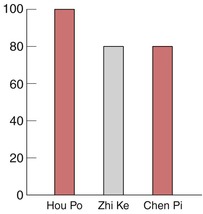 |
| Fig. 10.1. |
| Comparison of the herbs that regulate the Lung-Qi. Hou Po ( Magnoliae cortex), Zhi Ke ( Aurantii fructus), Chen Pi ( Citri reticulatae pericarpium). |
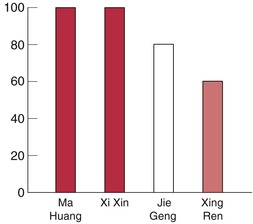 |
| Fig. 10.2. |
| Comparison of the herbs that disperse the Lung-Qi. Ma Huang ( Ephedrae herba)*, Xi Xin ( Asari herba)*, Jie Geng ( Platycodi radix), Xing Ren ( Armeniacae semen). |
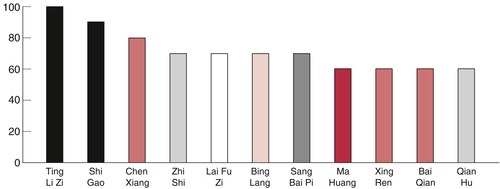 |
| Fig. 10.3. |
| Comparison of the herbs that direct the Lung-Qi to descend. Ting Li Zi ( Lepidii/Descurainiae semen), Shi Gao ( Gypsum), Chen Xiang ( Aquilariae lignum), Zhi Shi ( Aurantii fructus immaturus), Lai Fu Zi ( Raphani semen), Bing Lang ( Arecae semen), Sang Bai Pi ( Mori cortex), Ma Huang ( Ephedrae herba)*, Xing Ren ( Armeniacae semen), Bai Qian ( Cynanchi stauntonii radix), Qian Hu ( Peucedani radix). |
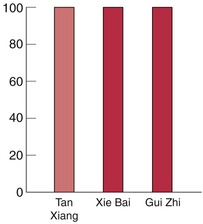 |
| Fig. 10.4. |
| Comparison of the herbs that regulate the Heart-Qi. Tan Xiang ( Santali albi lignum), Xie Bai ( Allii macrostemi bulbus), Gui Zhi ( Cinnamomi cassiae ramulus). |
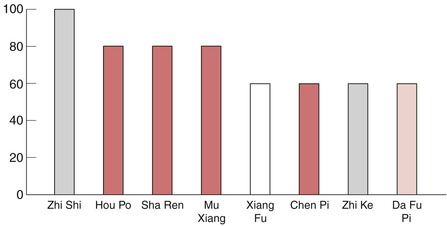 |
| Fig. 10.5. |
| Comparison of the herbs that regulate the Spleen-Qi and the Stomach-Qi. Zhi Shi ( Aurantii fructus immaturus), Hou Po ( Magnoliae cortex), Sha Ren ( Amomi xanthioidis fructus), Mu Xiang ( Aucklandiae radix)**, Xiang Fu ( Cyperi rhizoma), Chen Pi ( Citri reticulatae pericarpium), Zhi Ke ( Aurantii fructus), Da Fu Pi ( Arecae pericarpium). |
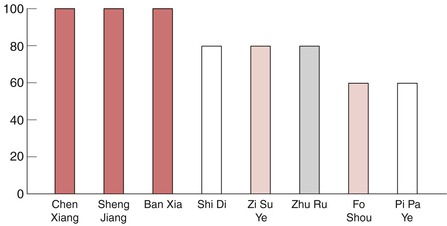 |
| Fig. 10.6. |
| Comparison of the herbs that soothe the Stomach-Qi. Chen Xiang ( Aquilariae lignum), Sheng Jiang ( Zingiberis rhizoma recens), Ban Xia ( Pinelliae rhizoma), Shi Di ( Kaki diospyri calyx), Zi Su Ye ( Perillae folium), Zhu Ru ( Bambusae caulis in taeniam), Fo Shou ( Citri sarcodactylis fructus), Pi Pa Ye ( Eriobotryae folium). |
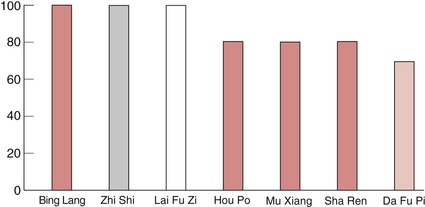 |
| Fig. 10.7. |
| Comparison of the herbs that regulate the Qi in the Large Intestine. Bing Lang ( Arecae semen), Zhi Shi ( Aurantii fructus immaturus), Lai Fu Zi ( Raphani semen), Hou Po ( Magnoliae cortex), Mu Xiang ( Aucklandiae radix)**, Sha Ren ( Amomi xanthioidis fructus), Da Fu Pi ( Arecae pericarpium). |
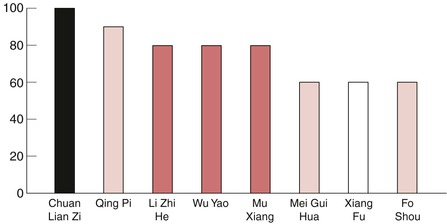 |
| Fig. 10.8. |
| Comparison of the herbs that regulate the Liver-Qi. Chuan Lian Zi ( Toosendan fructus), Qing Pi ( Citri reticulatae viride pericarpium), Li Zhi He ( Litchi semen), Wu Yao ( Linderae radix), Mu Xiang ( Aucklandiae radix)**, Mei Gui Hua ( Rosae flos), Xiang Fu ( Cyperi rhizoma), Fo Shou ( Citri sarcodactylis fructus). |

